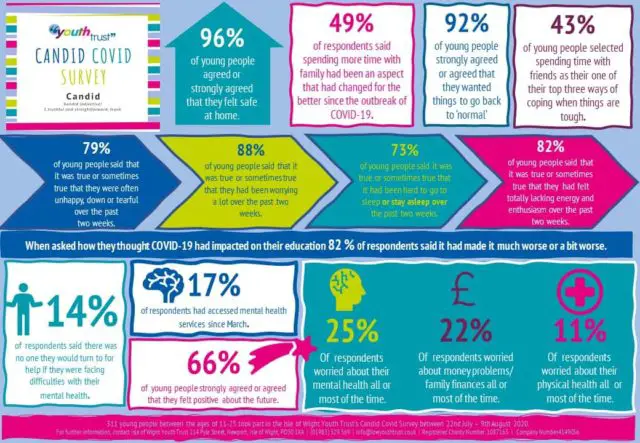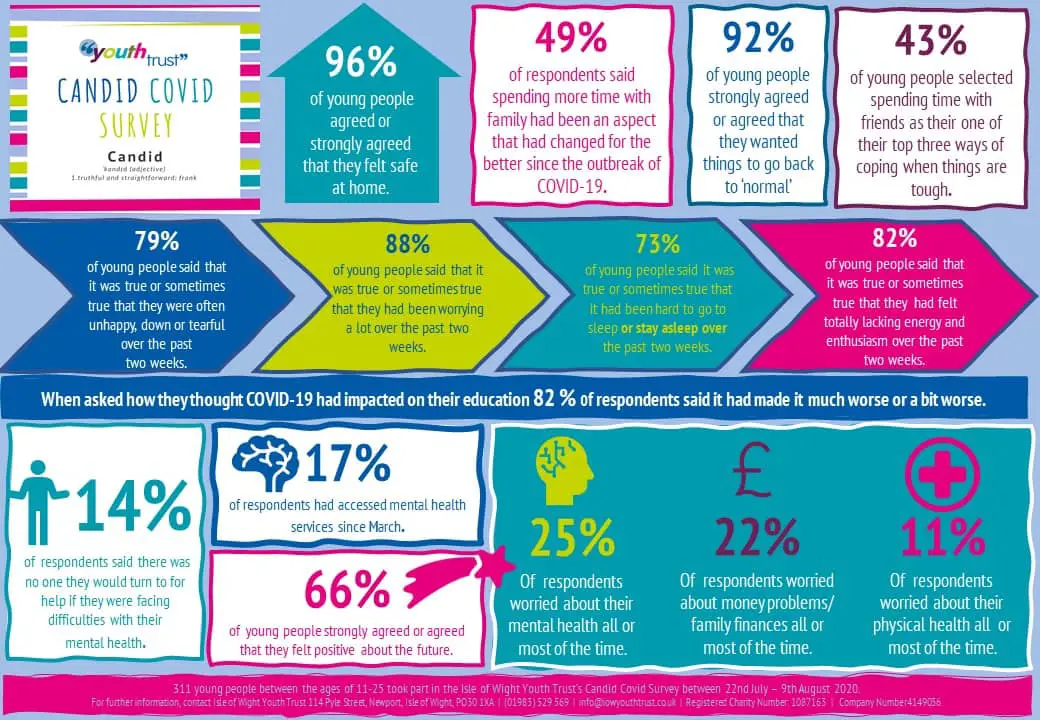The Isle of Wight Youth Trust has today (Youth Mental Health Day) launched findings from their recent Candid Covid Survey, shedding light onto how the outbreak of Covid-19 has impacted young Islanders’ mental health and emotional wellbeing.
311 young people aged 11-25 from across the Island took part in the online survey between 22nd July and 9th August.
Key findings included:
- 88% of young people said it was true (44%) or sometimes true (44%), that they had been worrying a lot.
- 73% of young people said it was true (40%) or sometimes true (33%), that it had been hard to go to sleep or stay asleep.
- 79% of young people said it was true (37%) or sometimes true (42%), that they are often unhappy, down or tearful.
- 65% of young people said it was true (26%) or sometimes true (39%), that they have many fears and are easily scared.
- 82% of young people said it was true (45%) or sometimes true (37%), that they had felt totally lacking in energy and enthusiasm.
- 64% of young people said it was true (27%) or sometimes true (37%), that they had felt terribly alone and isolated
- 82% of respondents felt that the outbreak of COVID-19 had made their education either much worse or a bit worse, 13% felt it had made no difference, 3% felt it had made their education a bit better and 2% felt the outbreak of COVID-19 had made their education much better.
- Of the respondents who were of working age:
– 45% did not have a paid job at the time of completing the survey and 55% did have a paid job.
– 64% felt that COVID 19 had made their employment opportunities either much worse or a bit worse.
– 25% of young people worried about their mental health all or most of the time. 11% worried about their physical health most or all of the time.
Cannock: Important young people’s voices are heard
Youth Trust Chief Executive Clare Cannock said that while some of the survey findings were confronting, it is important that young people’s voices are heard as services continue to adapt.
“We would like to thank all young Islanders who made their voices heard at this crucial point in time. It is essential that young people are provided with opportunities to set the agenda for services, like the Youth Trust, which are here to support them.
“Since March, the Youth Trust has transitioned from face-to-face work to online and phone counselling. We are currently piloting a walk and talk service, to allow young people access to the best and safest possible services.
“As we further develop our services, particularly as we move forward with our plans to establish a Youth Hub in Newport, these findings will help ensure our services are focused where the need is.”

Cannock: Worry, unhappiness, fear and loneliness all increasing
Commenting on the census finding, she further added,
“These findings add to the picture of young Islanders’ Mental Health we already have from our Biennial Island Youth Mental Health Census. Comparing our findings from our 2019 Census, to our Covid survey, we see worry, unhappiness, fear and loneliness all increasing.
“Looking at worry specifically, in our 2019 Census, we found that 72% of young people said that it was either ‘true’ or ‘sometimes’ true that they had been worrying a lot. In this survey, that number has risen to 88%, which is shocking if not surprising.
“The area that young people were most worried about out of 14 possible options was mental health, with 25% of young people worrying about their mental health all or most of the time. This sends a clear message that mental health needs to be prioritised as we think about recovery across our community, particularly as young people head back into education and added pressures are introduced.
“It is our hope that these findings prompt all Islanders to think about how they can support the young people. It is up to us all to ensure that mental health is prioritised, alongside physical health going forwards and that this is backed up by adequate funding and policy solutions.”
News shared by Felicity on behalf of Isle of Wight Youth Trust. Ed





